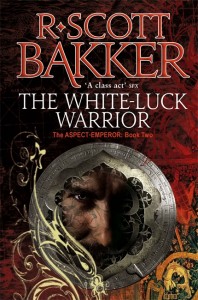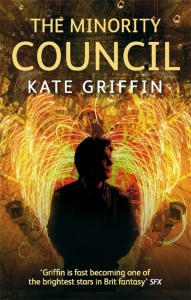R. Scott Bakker on A Game of Thrones and deconstructing the epic fantasy genre
 Over the last few years, R. Scott Bakker has established himself at the forefront of the epic fantasy genre, known not just for his tales of grand battles, dangerous intrigue and explosive sorcery, but also for his detailed worldbuilding and the philosophical undertones in his writing.
Over the last few years, R. Scott Bakker has established himself at the forefront of the epic fantasy genre, known not just for his tales of grand battles, dangerous intrigue and explosive sorcery, but also for his detailed worldbuilding and the philosophical undertones in his writing.
His latest novel THE WHITE-LUCK WARRIOR [UK | ANZ] is now out in mass market paperback, and is his best novel to date. Adam Whitehead, of excellent UK genre blog The Wertzone, had this to say:
“The White-Luck Warrior (*****) is a powerful, engrossing, ferociously intelligent novel that sees Bakker at the very top of his game. It leaves the reader on the edge of their seat for the concluding volume of the trilogy, The Unholy Consult, which we need yesterday.”
To celebrate the release of THE WHITE-LUCK WARRIOR, Adam conducted an interview with Scott and the result is a fascinating discussion that covers Scott’s entire career, from his original influences to the development of epic fantasy in recent years.
Scott, I have to start by asking those most dreaded of general questions: how would you describe your books and what they are about for newcomers? Why should they read The Prince of Nothing and The Aspect-Emperor series?
I wrote The Prince of Nothing and The Aspect-Emperor for two kinds of fantasy readers: those who love believing in secondary fantasy worlds, and those who think they have ‘outgrown’ the genre. Over and above that, they’re dark, violent, cerebral and genuinely controversial. I’m beginning to think they have a real shot at becoming ‘classics.’
What was the original impetus behind writing the series? You’ve mentioned your appreciation of authors like J.R.R. Tolkien and Frank Herbert, and developing Earwa as a roleplaying setting when you were much younger. How did those influences feed into the writing of the series?
They say our neural architecture is wild and bushy throughout childhood, and then in adolescence the brain begins to prune and streamline its structure. This could be why our teenage reading stamps our sensibilities so profoundly: I’m sure when I die and the medical community dissects my brain in the name of scientific comedy they will find little Guild Navigators playing D&D with lecherous old orcs. The thing for me was never allowing university convince me I needed to turn my back on these things, always remembering they were so popular and so appealing precisely because they were so profound.
Frodo read Nietzsche, you know. (more…)
















